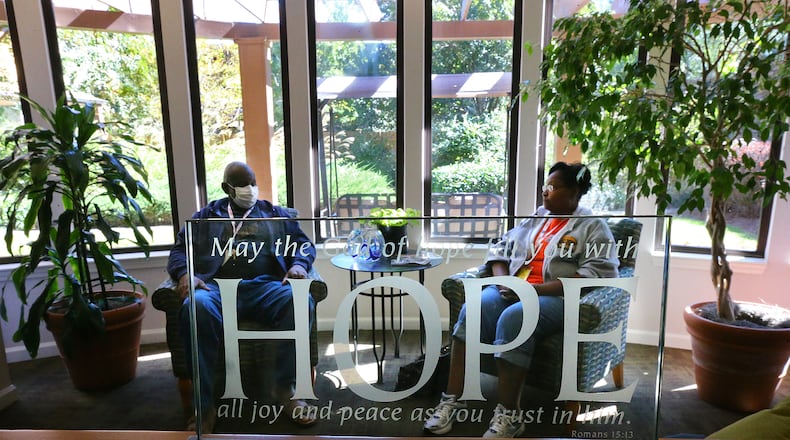American Cancer Society Hope Lodges provide free, temporary housing for cancer patients and caregivers in an emotionally supportive “home away from home” environment.
The Hope Lodge is available for adults receiving outpatient cancer treatment who live at least 50 miles away from their treatment center. The American Cancer Society operates 31 Hope Lodge facilities across the United States and Puerto Rico. The one in Atlanta is located on the edge of Emory University’s Clairmont campus. Patients staying at the Atlanta lodge can receieve treament at any area hospital including Piedmont Hospital and Northside Hospital. About half of the patients are from Georgia. The average stay is about 30 days but some patients stay up for a year or even longer.
In 2013, families staying at one of the 31 Hope lodges saved an estimated $38 million in hotel expenses.
For more information, http://www.cancer.org/treatment/supportprogramsservices/hopelodge/
Howard Scales recently started a round of intensive chemotherapy at Northside Hospital. Not only did the cancer treatments take a lot out of him – the logistics of getting to the hospital from his Gainesville home took a toll. He needed to arrange for a ride, more than 50 miles each way, every day.
But within a few days, Scales received the call he was hoping for – a spot opened up at the American Cancer Society Winn-Dixie Hope Lodge in Atlanta, which provides free, short-term housing for cancer patients and caregivers.
Scales now has a place to stay close to the hospital. The Atlanta Hope Lodge also provides free transportation to his regular cancer treatments, which can last up to 10 hours a day. Now in his second week at the Atlanta Hope Lodge, Scales said this lodge, tucked away in a wooded area, is not simply a place to crash, but “a home away from home,” a cozy and emotionally nurturing place of refuge.
Instead of feeling like a patient 24/7, he is a person with time to unwind, take walks and play bingo.
The Atlanta Hope Lodge is one of 31 Hope Lodges across the country and Puerto Rico. Opening in 1998, the Atlanta Hope Lodge — with 52 private suites, eight mini-kitchens, a game room and library — is one the largest in the country. Construction is underway for one in Salt Lake City, and more new lodges are planned for Houston, Dallas, Omaha, Jackson, Miss. and Honolulu during the next couple years.
At the Atlanta lodge, there is currently a three-week waiting list. Once a patient and caregiver check in, the average stay is about 30 days; but patients can remain as long as needed — up to a year or longer.
Dozens of volunteer groups, from local churches to Emory students and local businesses to cancer survivors who once resided at the Atlanta Hope Lodge, provide dinners a few nights a week for residents.
Scales, diagnosed with stage III lymphoma, has been undergoing treatment for several months. At one point, he was hospitalized for several days while undergoing a potent dose of chemotherapy. He is scheduled to undergo a bone marrow transplant later this month.
On a recent afternoon, Scales, 52, is wearing shorts and a T-shirt, kicking back in a leather recliner. This round of treatment has been the most pleasant, he said, noting that his surroundings are making a difference. He loves to relax in a corner sun room with fluffy green pillows. Always festive, orange silk maple leaves and ceramic pumpkins now dot the lodge, adorning the fireplace and dining room tables. Scales shares a suite with his younger sister and caregiver, Linda Aikens, who lives in the Athens area. But they are often about — either on the swings and rocking chairs, strolling the grounds and chatting and — bonding — with other families whose loved ones are facing cancer treatments.
“You don’t need a lot of stress when you are going through something like this,” said Scales, a retired nurse. “And this place is a relaxing environment. And the people here are all your friends.”
Aikens raves about the attention to detail, marveling at the crock pot and spices in the kitchen, and being given laundry detergent.
“I toured here before we moved in and realized all we need is our clothes and food,” she said. “They take care of the rest.”
Her brother nodded and added: “And this allows me to focus on my health and recovery.”
About the Author
Keep Reading
The Latest
Featured



